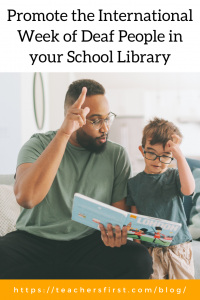September 19th–25th is the International Week of Deaf People, an annual initiative to foster awareness and support of the deaf and hard-of-hearing community. The 2022 theme is Building Inclusive Communities for All. The National Association of the Deaf (NAD), an affiliate of the World Federation of the Deaf, promotes the International Week of Deaf People to achieve the following objectives:
- Gain a greater understanding of the American deaf and hard of hearing community and its culture and heritage.
- Learn about sign language as an essential human right and how it is growing in popularity across the United States.
- Find out about resources within your community, e.g., sign language classes.
- Discover ways to promote the human rights of deaf people and access to education and technologies.
School libraries can be instrumental in assisting school communities with achieving these objectives!
School libraries should be welcoming and engaging for deaf and hard-of-hearing students. School librarians can be instrumental in educating school communities about deaf culture and history through education, programming, and resources. Librarians can also engage students in deaf culture by highlighting notable deaf people throughout history or by reading about deaf people and their experiences, allowing students to connect with deaf culture and the community. Additionally, librarians can collaborate with teachers to lead activities and lessons that use primary sources about the deaf from the Library of Congress and The Museum of Deaf History, Arts, and Culture. Share these resources with teachers for use in their classrooms!
There are many resources available to teach and learn Sign Language. Start by learning helpful library signs! Then, use handouts and videos to set up a sign language learning center in your library. Plan a lesson or activity to go with it. Provide teachers with sign language resources. Supplement your read-alouds with sign language interpretations. Immerse students in sign language for the week!
Educate students and staff about specific human rights issues for deaf people. Provide access to resources around advocacy organizations. Make teachers and administrators aware of laws and actions around inclusive teaching of deaf people. Provide your school community with tools to assist with inclusive teaching. Those tools might include the ASL Online Dictionary, the Described and Captioned Media Program, and the Project ENABLE resource database, which provides a variety of resources for librarians, teachers, parents, and others who serve or support people with a variety of differently-abled populations.
Your inclusive and welcoming library is the perfect place to highlight and celebrate the deaf community! TeachersFirst has a variety of resources to assist in your planning and celebration. In addition, we always enjoy hearing your ideas and tips for other librarians in the comments!


